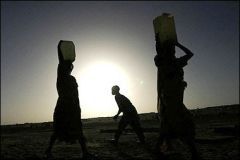FEATURE: Little hope for Darfur
By Joyce Mulama
NAIROBI, Dec 24, 2004 (IPS) — As 2004 draws to a close, the people in Sudan’s western province of Darfur have no reason to celebrate but flee the violence that has continued to spread in the volatile region, despite a ceasefire signed between the government and rebels in November.

|
|
Displaced Sudanese women carry buckets of drinking water in Abu Shouk Camp on the outskirts of the northern Darfur region of El-Fasher. (AFP). |
Fighting has erupted in Labado, south of Darfur over the past few days, forcing thousands of civilians to flee their villages, according to Medicins Sans Frontieres (MSF), an international aid agency.
”The first people who fled the fighting are arriving on foot in the towns of Shariya (50 km north of Labado) and Kalma (100 km west of Labado),” noted a statement from the organisation Dec. 22. Labado, with a population of 27,000, is now empty and destroyed, according to the MSF.
The majority of the people, who have fled Labado, were refugees from other areas in Darfur.
The latest fighting in Darfur is taking place in the face of a ceasefire signed Nov. 9 between the government and rebels of the Sudan Liberation Movement (SLM) and Justice and Equality Movement (JEM) in Abuja, Nigeria. The talks have been taking place in Nigeria since August 2004.
The negotiations, brokered by the African Union (AU), have been marred by breakdowns caused by the rebels who have accused the government, among others, of launching an offensive against their positions. The latest talks collapsed last week.
To the chagrin of the rebels, the 53-member African Union has sent less than 1,000 peacekeepers, out of the proposed 3,200, to Darfur. Even with the arrival of 99 more troops from Gambia this week, the number is still considered so low to monitor the peace in Darfur, a territory the size of France or Iraq.
Concerned about the increasing violence, the UN Security Council has called upon Khartoum to double its efforts to restore law and order in Darfur. Meeting in Kenya’s capital Nairobi last month, the council urged both government and Darfur rebels to make peace by Dec. 31. This was the third resolution passed after similar ones in July and September.
The Darfur conflict erupted in Feb. 2003 when the SLM and JEM took up arms against Khartoum, accusing the Arab-dominated government of marginalising and persecuting black African tribes in the region.
The government reacted by arming Arab militia (known as janjaweed or men on horseback) who have been attacking the black Fur, Masalit and Zaghawa. The janjaweed have murdered and raped and uprooted more than 1.6 million civilians from their villages, according to the United Nations.
The conflict has left more than 70,000 people dead since it erupted 22 months ago, aid agencies say.
”It’s one of the worst humanitarian crises with an unpredictable situation on the ground,” Roshan Khadivi, UN Children Fund’s external public relations officer in Darfur, told IPS in a telephone interview Dec. 22.
”About two and a half million people, mostly children under the age of 18, have been affected by the conflict that has hampered delivery of humanitarian goods,” she said. ”The situation is fluid and there is an influx of people in the camps in Darfur.”
According to her, the situation in Darfur will only improve if security is beefed up and access is increased to the displaced persons.
”Parties must commit to a peaceful agreement to guarantee safety of aid workers and ensure that humanitarian aid reaches all camps,” Khadivi said.
Darfur is becoming a dangerous place for aid workers. Four workers of Save the Children, a British charity, had been killed in Darfur, prompting the organisation to pull out on Dec. 21.
An MSF worker was also murdered Dec. 17, the second in three months.
Political analysts say the warring parties must implement what they have signed in the presence of the international community. ”The international community should have laid down punitive repercussions should parties fail to live up to their commitments, particularly the government,” David Mozersky, a Sudan analyst with the International Crisis Group, a Brussels-based think tank, told IPS.
The United Nations is now trying to get tough on Sudan. ”There comes a time when you have to make a reassessment as to whether the approach you’ve taken is working or not,” Kofi Annan, the UN secretary General, told journalists at the UN headquarters in New York Dec. 21.
To end the conflict, Sudanese opposition groups believe that the underlying root of the Darfur problem should be addressed first. ”The fundamentals have to be addressed. Arabs in the north want to see Darfur depopulated so that they can settle in the farming-rich Darfur,” Rev. Haruun Runn, Executive Director of the New Sudan Council of Churches, said recently.
The blacks in Darfur are Muslims who have adopted some form of Arab cultures.
”The Darfur crisis cannot be solved by the quick-fix approach, that’s why it will extend to next year,” Runn said.
Some experts believe that the Darfur conflict cannot be addressed in isolation. It has to be addressed within the framework of the larger north-south peace deal, which is expected to be signed in Nairobi by Dec. 31. ”As long as Darfur continues to burn, implementation of the south-north agreement will be very difficult,” Mozersky observed.
The conflict between the north and the south has been ragging since 1955, save for an interlude of peace from 1972 to 1983.
The current civil war, which erupted in 1983, has killed more than two million people and displaced over four million others. The peace talks, which opened in Kenya in 2002, have led to signing of six protocols on key issues including one on wealth and another on power sharing.
What remains now is for the Sudan government and the rebel Sudan People’s Liberation Army (SPLA) to agree on a comprehensive ceasefire and modalities for the implementation of the six protocols.
